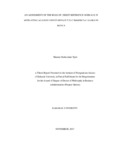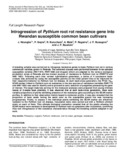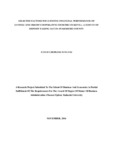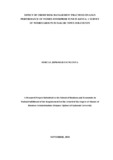AN ASSESSMENT OF THE ROLE OF CREDIT REFERENCE BUREAUS IN MITIGATING AGAINST CREDIT DEFAULT IN COMMERCIAL BANKS IN KENYA
Abstract
The study assessed the role of Credit Reference Bureaus (CRB) in mitigating default risk among commercial banks in Kenya. The objectives of the study were to analyze risk identification as a CRB role in mitigating against credit default in commercial banks in Kenya. To assess customer repayment behavior as a CRB role in mitigating against credit default in commercial banks in Kenya. To investigate customer credit access as a CRB role in mitigating against credit default in commercial banks in Kenya. To examine reduction in the rate of moral hazard as a CRB role in mitigating against credit default in commercial banks in Kenya. The study was based on the Adverse Selection Theory, the Moral Hazard Theory, and Credit Rationing Theory. The study used a CausalComparative descriptive survey design in evaluating the role of CRB in mitigating against credit default in commercial banks in Kenya. This design was appropriate for this study because comparison allowed for the establishment of conclusive causality attributing observed changes in the role of Credit Reference bureau practices in mitigating against credit default. The researcher employed descriptive statistical analysis and methods of analyzing correlations and regressions between multiple variables. The target population of the study consisted of all the 43 licensed commercial banks in Kenya under the Banking Act. The researcher used census method for the research, which composed of all commercial bank headquarters credit managers. To collect primary data, the researcher used questionnaires. Besides, Secondary data required for this study were collected from loan books and CBK annual Bank supervisory reports. With the help of research assistants, the researcher visited the institutions and administered the questionnaires. To ensure validity, questionnaire was prepared in conjunction with literature review and based on the research objectives. Its content validity was pre-tested by a pilot study carried out in Diamond Trust Bank and Investment and Mortgage Commercial banks headquarters in Nairobi. The study yielded Cronbach’s Alpha of 0.8 SPSS software was used to analyze the data and results presented using graphical systems, which included histograms pie charts and frequency distributions tables. The researcher used descriptive statistics, which included the mean, median standard deviation and range to show the default rate. The researcher conducted inferential statistical tests that comprised of correlation, ANOVA regression Chi-square analysis to test hypothesis. P -values yielded were less than 0.05, which indicates that the roles played by Credit Revenue Bureau have significant influences on the Credit Default Rate in commercial banks in Kenya. The conclusion was that CRB plays a significant role in risk identification, rate of credit repayment, credit access, and reduction of moral hazards and credit information evaluation in mitigating against credit default in commercial banks in Kenya. The study recommends that the CRB be extended to all non-banking sectors that handle credit transactions to reveal more credit histories of different borrowers. In addition, CRB firms in Kenya should link with other regional CRB firms in other countries as to have information on credit histories of those crossing the borders to promote more credit accessibility and reduce credit default.
Collections
Related items
Showing items related by title, author, creator and subject.
-
Effect of Credit Risk Management Practices on Lending Portfolio Among Savings and Credit Cooperatives in Kenya
K Lagat, Fredrick; Mugu, Robert (Kabarak University, 2013-11)Sound lending procedures in financial institutions involve identifying high-risk loan applicants, modifying lending conditions such as security requirements and monitoring repayments. Credit risk management is an emerging ... -
SELECTED FACTORS INFLUENCING FINANCIAL PERFORMANCE OF SAVINGS AND CREDIT COOPERATIVE SOCIETIES IN KENYA: A SURVEY OF DEPOSIT TAKING SACCOs IN KERICHO COUNTY
MUTAI, FAITH CHEPKOECH (KABARAK UNIVERSITY, 2016-11)Savings and Credit Cooperative Societies (SACCOs) play an essential role in economic development as part of the financial system. In Kenya, 63% of population benefit from SACCOs. SACCOs are vital instrument embraced by ... -
EFFECT OF CREDIT RISK MANAGEMENT PRACTICES ON LOAN PERFORMANCE OF WOMEN ENTERPRISE FUND IN KENYA: A SURVEY OF WOMEN GROUPS IN NAKURU TOWN SUB-COUNTY
SUNGUNYA, DORCAS JEPKOSGEI (KABARAK UNIVERSITY, 2018-11)Women Enterprise Fund as any other credit business is exposed to credit risks. Credit advanced to women by WEF come along with credit risk challenges. How the fund has handled these risks challenges among women is not ...




